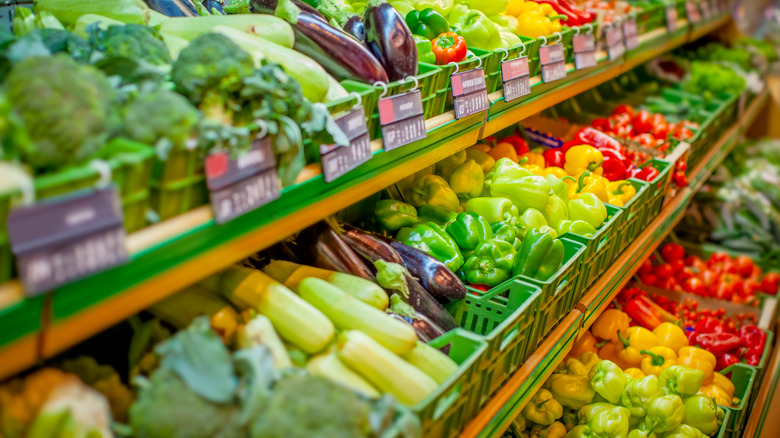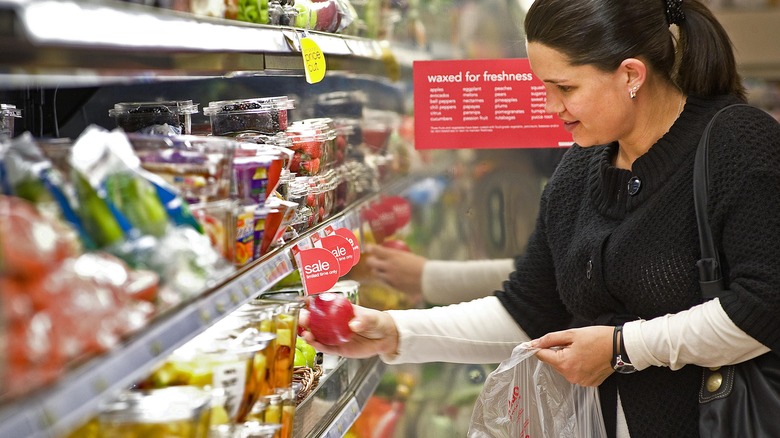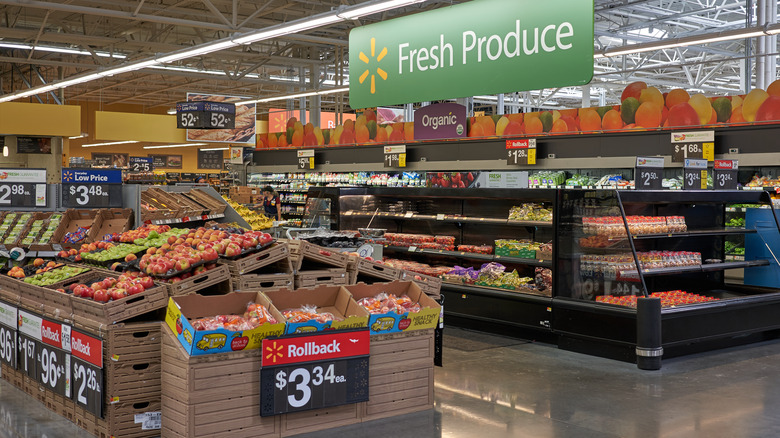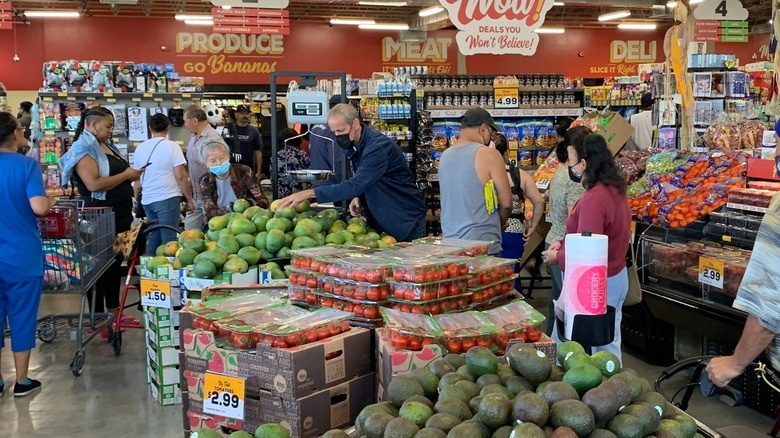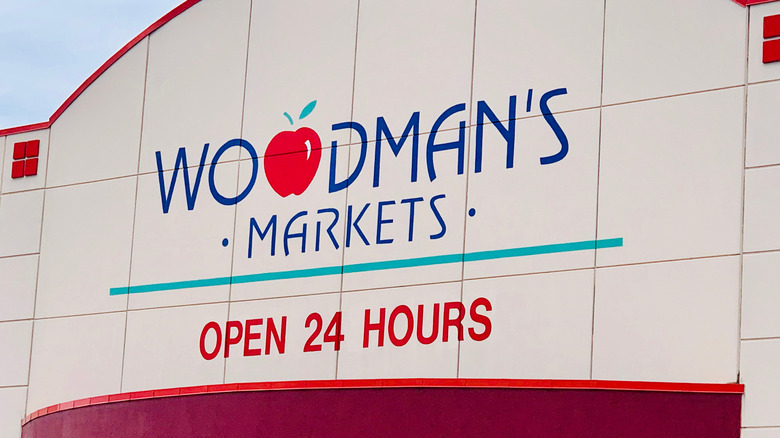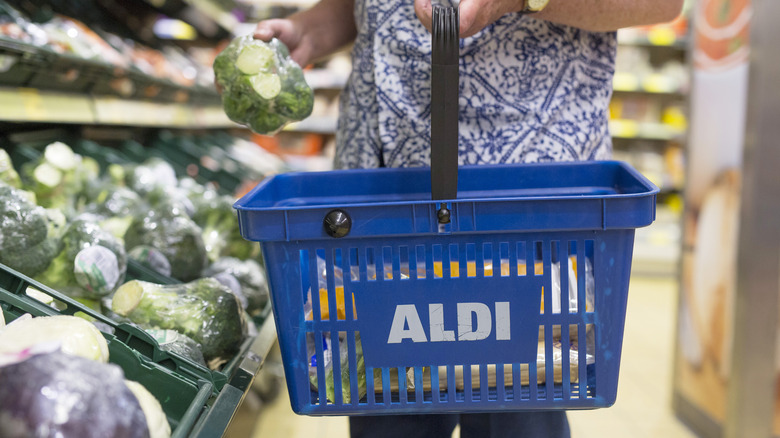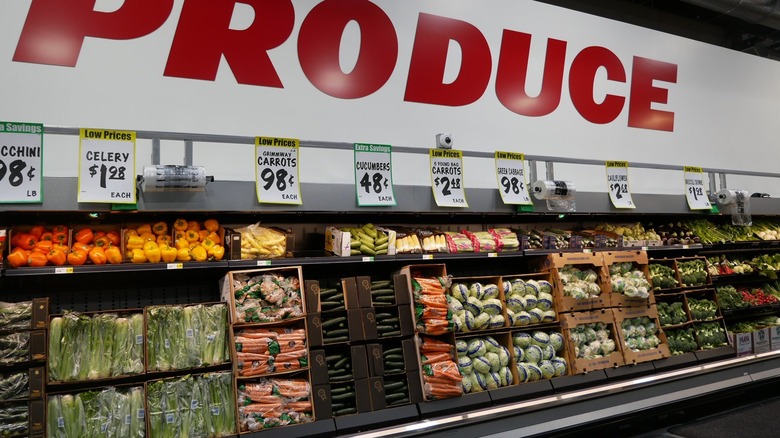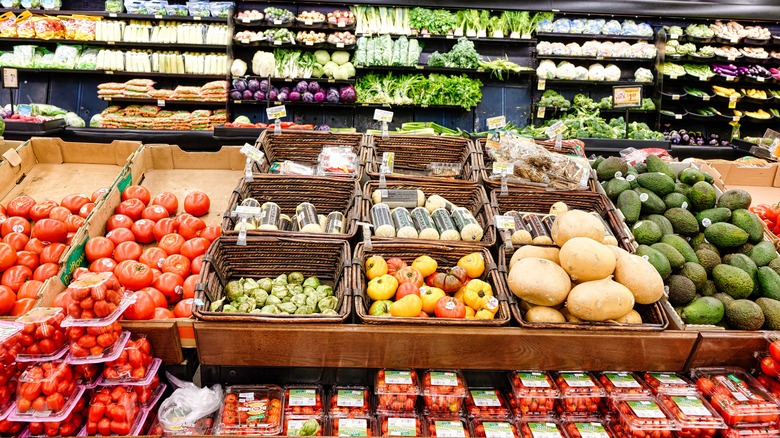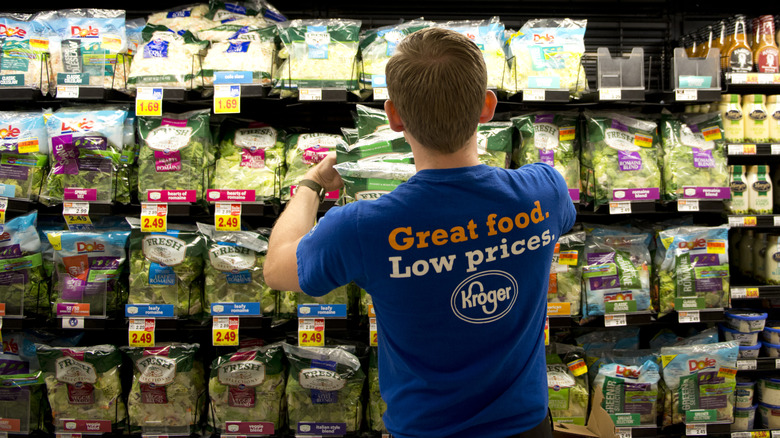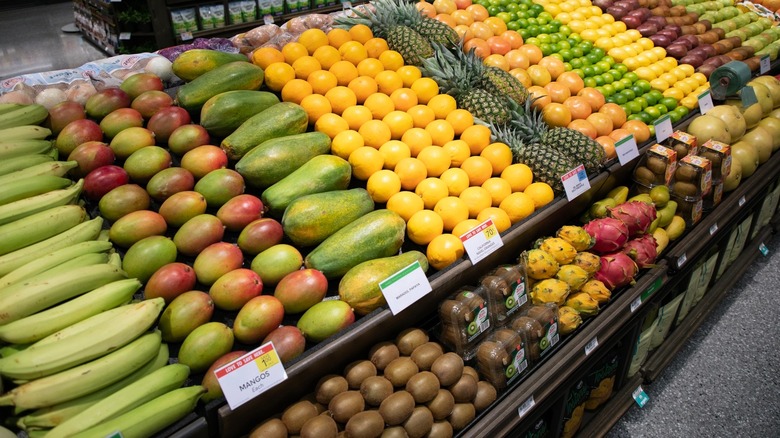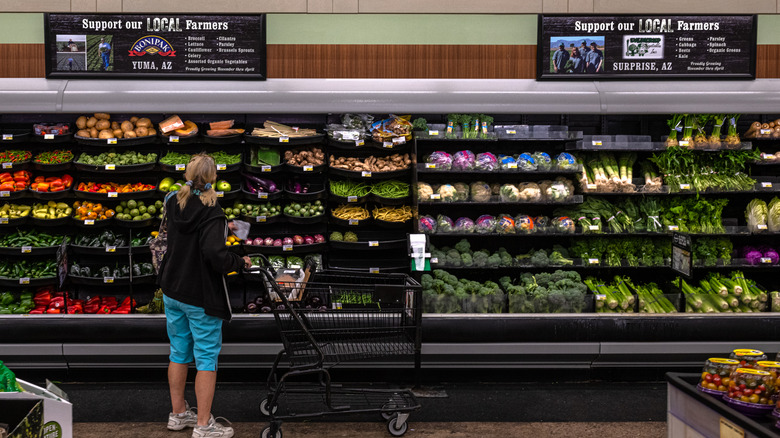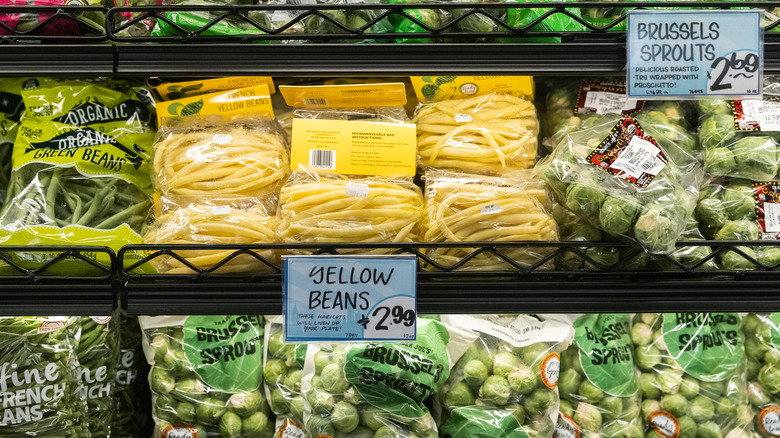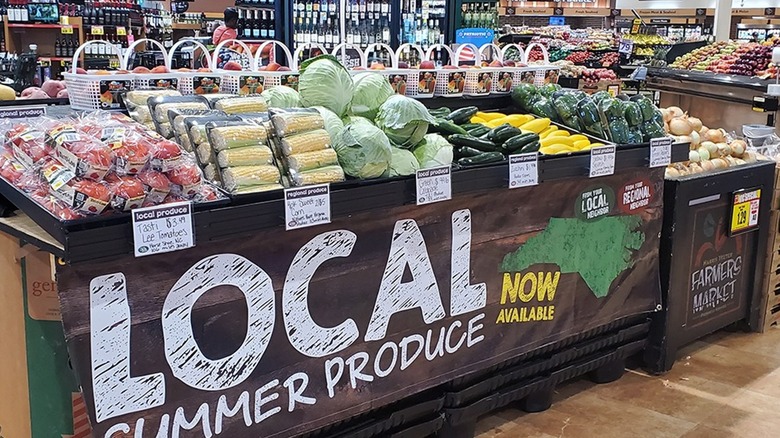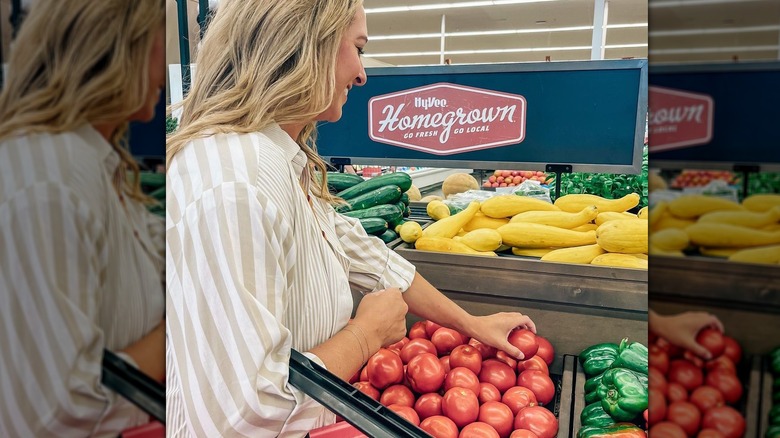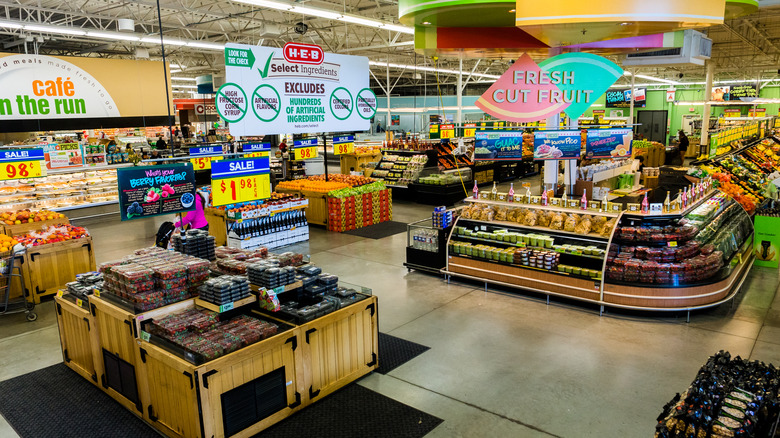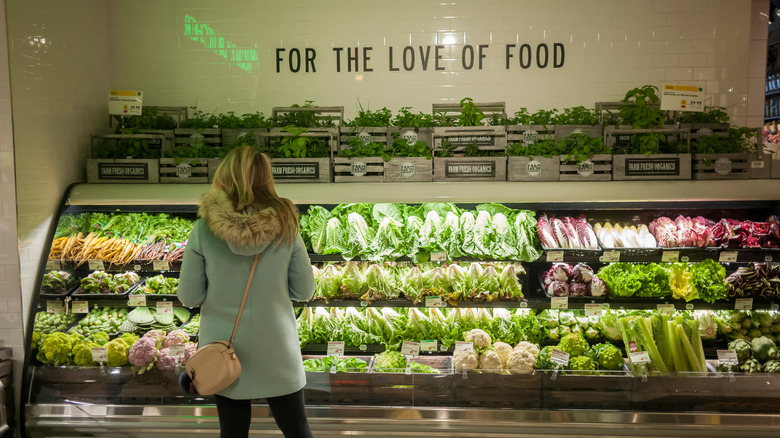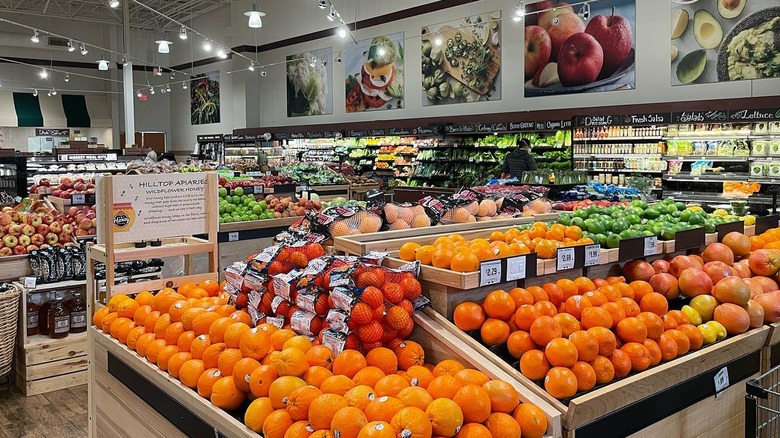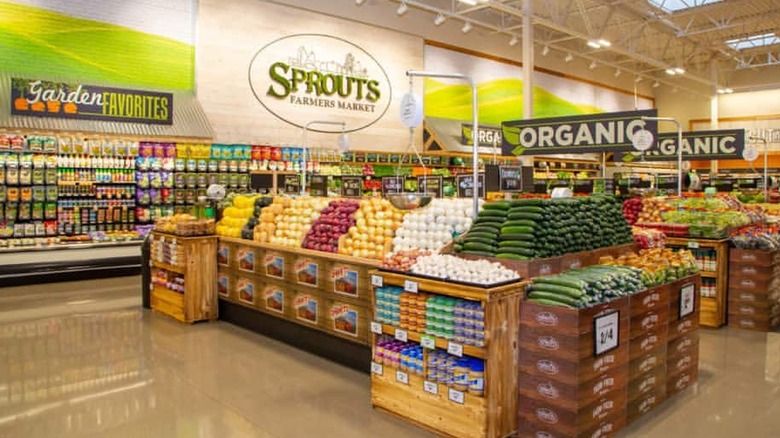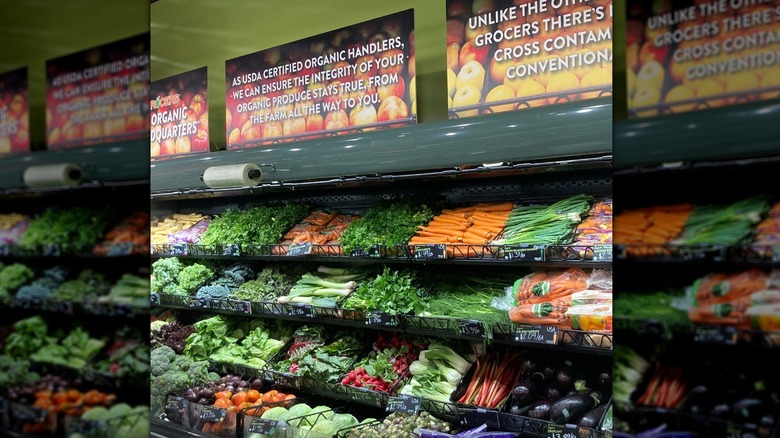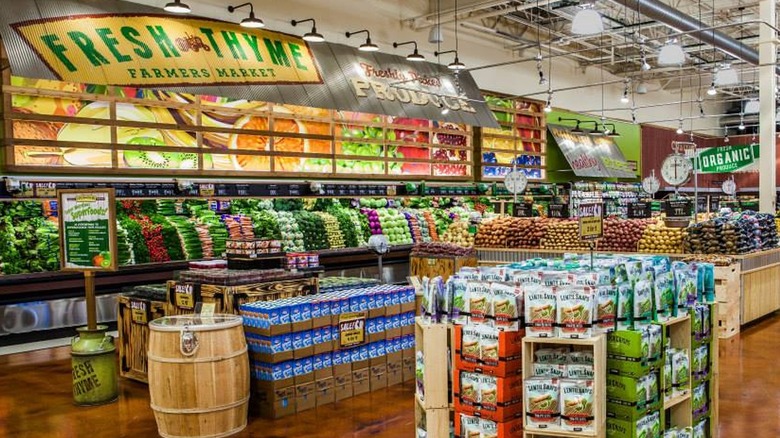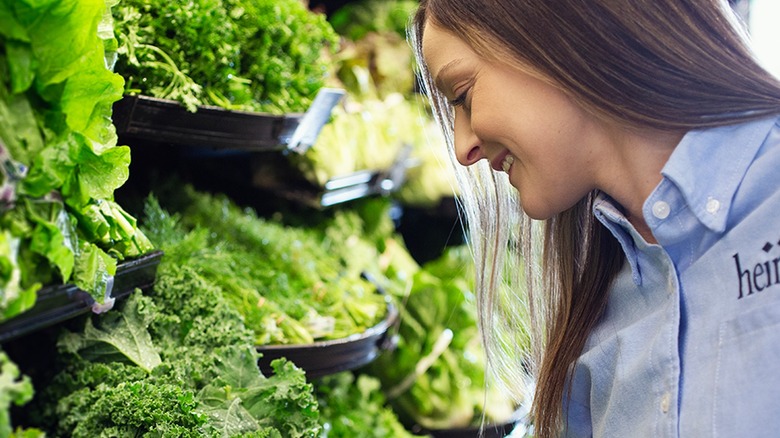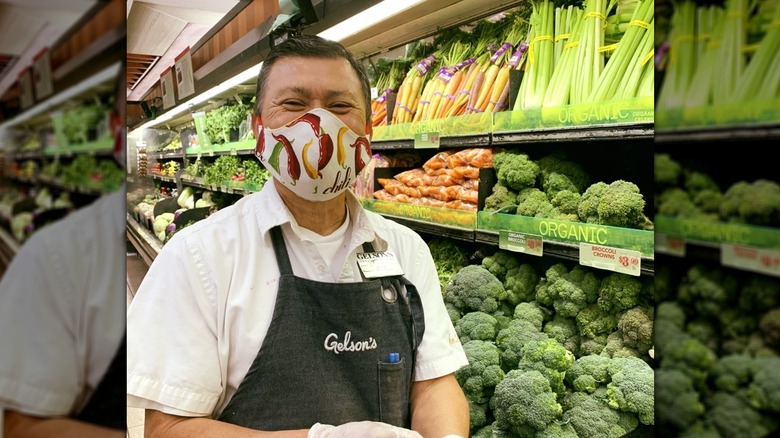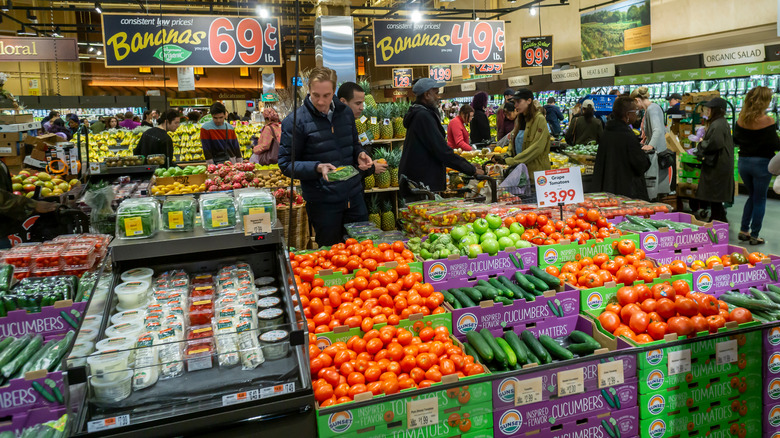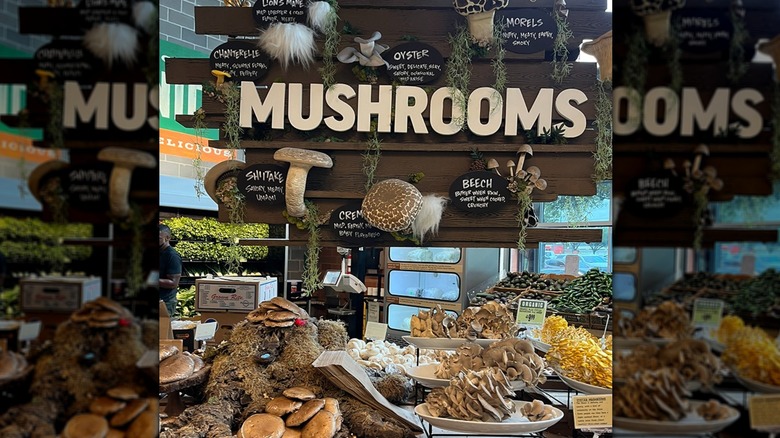The Produce Selection At 23 Popular Grocery Store Chains, Ranked
There's a lot that can be told about a grocery store, when judging the quality of its produce. Supermarkets put extensive effort into making that particular department look appealing — from attractive lighting to colorful displays to the appearance of a wide, fresh variety of options. It's often the first section seen when walk into a store. If the produce is vibrant and appetizing, other items in the store — from meat to fish to dairy — will likely be fresh as well.
Looking at decomposing, overripe or overpriced produce has the opposite effect. In addition to skipping the produce aisle altogether, it might make shoppers less willing or eager to spend on other items as they make their way up and down the grocery aisles.
With such factors in mind, we've looked at 23 popular supermarket chains nationwide. Below is an assessment of which has the freshest, best-presented produce, and which should be avoided altogether.
23. Target
Target offers one-stop shopping for everything from makeup to electronics. However, you should never buy fresh produce at Target. The store's produce is typically a tiny section, sandwiched between the meat, cheese, and juice aisles. The offerings tend to be scaled-back, often sold pre-packaged, like bags of salad and pre-cut fruits and vegetables.
While Target's produce buyers seem focused on improving the section's offerings, the prices remain higher than ideal, while its offerings are limited and lacking.
22. Walmart
Known for its low prices, Walmart has over 10,500 national and international locations, giving it immense buying power. The big box store often opts for the supplier offering the lowest price, passing the savings along to shoppers.
Nevertheless, such leverage may not always yield the highest quality, according to Consumer Reports and Checkbook.org. It also lacks variety, offering a small organic section and a standard mix of fruits and vegetables. Walmart has cut staffing across all departments in recent years, resulting in fewer workers checking produce quality or removing items that may have gone bad.
21. Grocery Outlet
Grocery Outlet began in 1946, selling discounted military supplies. Today, there are over 400 stores, determined to bringing customers name-brand products at heavily discounted prices. But the variety of produce options at Grocery Outlet tend to be on the smaller side.
The inventory constantly changes, due to the operation buying closeout and discontinued products or items nearing expiration. This means produce may expire quickly, and that products available today might not be tomorrow. Grocery Outlets are individually owned, allowing some product personalization based on local community preferences.
20. Woodman's Markets
Wisconsin-based Woodman's receives high ratings from shoppers for its low prices and overall product quality. The store has incredible brand loyalty, with 81% of shoppers saying they would recommend the store to others (according to Produce Blue Book).
However, the employee-owned grocer's produce quality could be more favorable. Most options are available in single units, allowing shoppers to select their apple or squash, versus having it pre-packaged. However, in a recent Consumer Checkbook poll, only 56% of shoppers ranked their produce quality high.
19. ALDI
ALDI is among America's fastest-growing grocery stores, thanks to low prices and product variety. Sourcing from local farms, they keep transportation costs and its carbon footprint low while selling most of its produce pre-packaged, eliminating excess employee labor to stock individual items.
Over the past few years, Aldi has redesigned its produce section, adding a refrigerated area to keep cool and expanding its organic offerings. Nevertheless, the number of items available within an Aldi store is well under 2,000 compared to tens of thousands at traditional supermarkets. The bottom line: a basic selection of fruits and veggies, requiring the purchase of more than most shoppers typically need.
18. WinCo Foods
WinCo proudly displays cost savings on signs throughout the store, comparing its costs to the competition. With 139 employee-owned locations in 10 states, it is one of America's most affordable grocery stores, offering large bulk bins, meat sections, and an expansive produce area.
Much of its produce is purchased from farms, keeping its prices low. But the variety of fruits and vegetables is typically a standard mix. We've found the shelf-life of various products to sometimes be sub-par, with items spoiling shortly after purchase.
17. Albertsons
One of the country's largest supermarket chains, Albertsons operates over 2,200 stores nationwide. But if high prices are a concern, it may not be your best option.
In a 2022 study, TradingPedia found a standard selection of fruits and vegetables at Albertsons to be 41% higher than at Walmart. In January of 2023, the store implemented an inventory management platform to assist with how and what they order, bringing fresher produce to its customers to combat concerns about the quality of their produce.
16. Kroger
Operating almost 2,800 stores in 35 states, Kroger's dates back to Cincinnati in 1883. From its beginnings, the company has prioritized the freshness of its products, believing that quality products at low costs attract customers.
With so many locations, it can be challenging to have consistency. We found some produce sections welcoming, with colorful displays of gorgeous fresh fruits and veggies ready to go into a vegetable stir fry or fruit salad. However, we found other locations with unappetizing displays of soft, decaying, or spoiled options.
15. Publix
Florida-based Publix has 1,200 stores in seven states across the Southeast. A retail leader with a reputation of personalized customer service and consistently reliable products, their prices are higher than some supermarkets, but a welcoming atmosphere and amiable workers make up for the extra costs.
The company sources conventional and organic produce from local farmers in and around the Sunshine State. Purchasing locally ensures the fruits and vegetables arrive fresh and ripe. Their variety is impressive (malanga blanca, green plantains, and boniato included), and, if an item does not meet expectations, Publix guarantees a full refund.
14. Safeway
A long-time innovator in the grocery business, Safeway was the first American store to introduce produce purchasing by the pound, and they also led the way in customers selecting products off the shelf personally. In February 2023, however, The Washington Post reported that Safeway's prices were some 32% higher than Walmart and 17% higher than Target in a local Virginia town.
Aside from costs, the quality of Safeway's produce is consistently fresh, and the team members are helpful. Stores offer organic and local products, whether it is a Buddha's hand in Hawaii, organic greens in Arizona, or Romanesco cauliflower in California.
13. Trader Joe's
Although frequently crowded, Trader Joe's has customer service-focused team members ready to assist. Arriving when the stores open can help avoid long lines.
Going early also allows for browsing, particularly in the produce section. Much of TJ's produce is sold pre-packaged, but since shipments arrive throughout the day, and associates replenish the fresh produce selection every morning (another reason to shop early), there isn't much concern for spoilage.
From dill-icious salad and fresh figs to riced cauliflower, zucchini noodles, and jicama wraps, there's always something new and fun to try. TJ's prices are also lower than most of its competitors.
12. Harris Teeter
North Carolina's Harris Teeter brings the produce of local farmers to its 250 stores across seven Southeastern states, supporting their local farms, which helps their communities. The supermarket offers fresh produce that meets the store's Green Thumb Expert's quality inspection; if an item fails to pass the company standards, it is returned to the farm.
Farmers often deliver their products within days of harvest. This quick delivery ensures fruits and vegetables are at their peak upon arrival. Produce is hand-picked for its location, so fresh strawberries from Blades Orchards will supply Maryland stores, whereas Delaware will receive berries from Fifer Farms.
11. HyVee
HyVee supermarkets work with 250 farms within 200 miles of its Midwest stores, sourcing seasonal produce for its HyVee Homegrown fruits and vegetables. Whether it be fresh melons from July through October or year-round hydroponic lettuce, herbs, and greenhouse vine-ripened tomatoes, HyVee's farmers deliver their produce directly to the stores when it is at its optimal freshness.
Although the employee-owned stores are regional and work with small mom-and-pop producers, they still offer prices that compete with national grocery chains.
10. H.E.B.
Texas-based H.E.B. is known for its wide selection, including smoked in-store Texas barbecue, freshly made daily tortillas, a plethora of in-store-made salads, sandwiches, snacks, and locally-grown Texas produce. The company partners with farms that work sustainably, with the grocer committing to source its produce locally before looking outside the state.
Its Texas-grown products are labeled with the name Texas Roots, showcasing Bexar County okra, Texas Hill Country peaches, and Texas-grown pecans. Other unique options include California plumcots and sweet Gum Drop grapes. Quality is guaranteed, as the store will fully refund any H.E.B. branded product if you don't like it.
9. Whole Foods Market
When Whole Foods opened in 1980, it was with the idea of bringing a natural food store to supermarket scale. Many grocers now carry organic products today, but Whole Foods was the first to become USDA organic certified.
It has maintained these values (even through a 2017 acquisition by Amazon) by delivering high-quality, organic products to its 500+ stores. Sourcing locally only applies to the produce department sometimes, with some locations having very few to zero locally-grown options. Amazon has helped lower Whole Foods' notoriously high prices by expanding its 365 private label. However, its produce department remains one of the most expensive in the country.
8. Fresh Market
Finding inspiration in neighborhood farmer's markets throughout European villages, Ray and Beverly Berry opened the first Fresh Market store in 1982. These days, 159 stores in 22 states continue to replicate the vibe.
Fresh Market's produce department is inspiring, filled with unique varieties of fruits and vegetables like purple Brussels sprouts, lemonade blueberries, lilikoi, jackfruit, and 14 types of melons, many from farms within the region. Items are hand-curated and inspected to ensure the quality meets the company's high standards.
7. Sprout's Farmers Market
Sprouts focuses on quality produce at inexpensive prices, sold quickly. This ideally results in less waste, lower costs and higher profits.
They are indeed able to sell produce for less than competitors, some 13% lower than Walmart (according to CBS News). The health-conscious grocer saw a 6% growth in its year-over-year net sales for the second quarter of 2023 (via Supermarket News). It is not just about profits for Sprouts, however; the company's values of providing healthy, natural foods at affordable prices remain at the heart of the company.
6. Natural Grocers
Everyone should have access to high-quality, organic produce, believes Natural Grocers. The health-conscious supermarket began in 1955, bringing exactly that to their community, hoping to improve the health and well-being of customers.
100% of their' fruits and vegetables are organic, ensuring there is no concern about cross-contamination. The store also refuses to coat produce with products that will extend its shelf-life. The family-owned business is committed to bringing its customers the quality and healthfulness that organic offers at affordable prices, on par with non-organic prices in other stores.
5. Fresh Thyme Market
Fresh Thyme Market delivers the best of both worlds when shopping for produce: high-quality and low prices. Shoppers rated the produce 100% in a Consumer's Checkbook poll, likely because the Midwest market works with growers in their community, sourcing locally from farms in America's breadbasket.
Fresh Thyme's in-store signage offers food transparency, ensuring shoppers know where their produce comes from and how it is grown, whether commercially, organically, or bio-dynamically. Additionally, depending upon the location, the supermarket's prices are lower than the national average, sometimes more than 10%.
4. Heinen's
Taking its produce very seriously, this Midwest market works diligently to ensure customers receive the freshest, most flavorful fruits and vegetables. They follow strict quality guidelines — like testing the sugar level in grapes, selling only USDA Extra Fancy grade citrus, and refrigerating apples to ensure they don't have a mealy, mushy taste.
The store's produce inspector checks every delivery to guarantee produce is ripe, flavorful, and ready to enjoy. The store carries 400 different produce options, including ten varieties of citrus and 150 USDA-certified organic products.
3. Gelson's
Gelson's has some of the freshest, highest-quality produce nationwide; it also has some of the most expensive grocery prices in the country, with locations primarily in affluent neighborhoods. It is with good reason, though, as items are hand-picked.
Their buyers work with local California producers to procure fresh produce straight from the farm. There's a large mix of organic and unique fruits and vegetables, like dragon fruit, sugar kiss melons, and dinosaur plums. The stores are welcoming, visually appealing, and have helpful employees ready to assist, creating loyalty even with a higher price tag.
2. Wegmans
East Coast-based Wegmans believes the most important reason to buy produce locally is a neverending quest for the freshest fruits and vegetables possible; many options hit store shelves the same day of harvest. Working with over 400 family farms, Wegmans ensures its produce doesn't have to travel far, making less of a carbon footprint while keeping dollars and cents within its communities.
Additionally, the grocer runs an organic farm and orchard in the Finger Lakes. The farm runs tests and trials of products, sharing findings with its grower partners to help produce sustainably-grown fresh, organic products for its stores.
1. Central Market
Shopping at Central Market inspires you to cook, especially if you aren't a foodie. The Texas-based chain specializes in locally grown options and unique, exotic fruits and vegetables you won't find elsewhere, focusing on what's in season. On any given day, there's over a dozen potato options, Brussels sprouts on the stalk, numerous peppers and tomatoes, and every type of fungi imaginable, including fresh white and black truffles when in season. The grocer even has a plant-based meat counter in the middle of the produce section.
In a recent Consumer Reports poll, Central Market received the highest score for its produce department out of every store in the country.
Static Media owns Tasting Table and Mashed.
